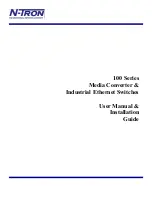
Switch Features Explained
17
■
Enable one of the less efficient paths if the most efficient path fails.
RSTP is an enhanced version of STP (Spanning Tree Protocol) and is fully
compatible with STP systems. RSTP can restore a network connection
quicker than the legacy STP feature. RSTP can detect if it is connected to a
legacy device that only supports IEEE 802.1D STP and will automatically
downgrade to STP on that particular port.
RSTP conforms to the IEEE Std 802.1w-2001.
For more information about RSTP, see
Chapter 4 “Using Resilience
Features”
.
Switch Database
The Switch Database is an integral part of the Switch and is used by the
Switch to determine if a packet should be forwarded, and which port
should transmit the packet if it is to be forwarded.
For more information about the Switch Database, see
Chapter 5 “Using
the Switch Database”
.
Traffic Prioritization
The traffic prioritization capabilities of your Switch provides Class of
Service (CoS) prioritization to your network. You can prioritize traffic on
your network to ensure that high priority data is transmitted with
minimum delay.
For more information about traffic prioritization, see
Chapter 6 “Using
Traffic Management”
.
Rate Limiting
Rate limiting is the restriction of the bandwidth to or from a section of
your network. Limiting the rate of network traffic reduces the stress on
your network and, when used with traffic prioritization, ensures that
important traffic is not held up when the network is busy.
For more information about rate limiting, see
Chapter 6 “Using Traffic
Management”
.
RMON
Remote Monitoring (RMON) is an industry standard feature for traffic
monitoring and collecting network statistics. The Switch software
continually collects statistics about the LAN segments connected to the
Switch. If you have a management workstation with an RMON
Summary of Contents for SUPERSTACK 3 3250
Page 8: ......
Page 20: ...20 CHAPTER 1 SWITCH FEATURES OVERVIEW...
Page 43: ...How STP Works 43 Figure 9 STP configurations...
Page 54: ...54 CHAPTER 6 USING TRAFFIC MANAGEMENT...
Page 66: ...66 CHAPTER 8 SETTING UP VIRTUAL LANS...
Page 70: ...70 CHAPTER 9 USING AUTOMATIC IP CONFIGURATION...
Page 98: ...98 CHAPTER 11 IP ROUTING...
Page 102: ...102 APPENDIX A CONFIGURATION RULES...
Page 106: ...106 APPENDIX B NETWORK CONFIGURATION EXAMPLES...
Page 132: ...132 INDEX...
















































